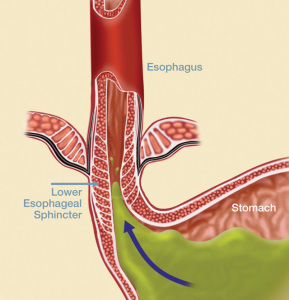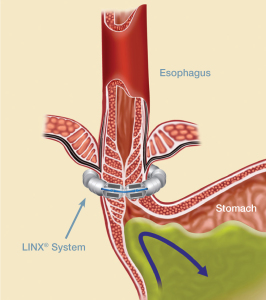If you suffer from chronic acid reflux, the LINX procedure may be on option for you. LINX is the only FDA-approved device for treatment of gastroesophageal reflux disease, or GERD. UC Health is proud to be the only system locally to offer this treatment. You can read about two patient’s experiences here.
LINX® is a small, flexible band of magnets enclosed titanium beads. The beads are connected by titanium wires. The magnetic attraction between the beads is designed to help keep the weak LES closed to prevent reflux (see Figure 2). Swallowing forces temporarily break the magnetic bond, allowing food and liquid to pass into the stomach. Magnetic attraction closes the LES after swallowing to reinforce the body’s natural barrier to reflux.

Figure 1: In people with GERD, the lower esophageal sphincter (LES) is weak, allowing acid and bile to reflux from the stomach into the esophagus.
LINX® is placed around the esophagus just above the stomach using a common, minimally invasive, surgical technique called laparoscopy. Patients are placed under general anesthesia during the procedure, which is generally completed in less than one hour. Once implanted, the device will begin working immediately.
https://youtu.be/AeKAcLLJuDo
Are You a Candidate for LINX?
You may want to consider the LINX System if you suffer daily from GERD symptoms, such as heartburn, regurgitation and nausea, or severe enough symptoms that effect your job performance, sleep and overall quality of life. The technology is best suited for patients, 21 and older, with mild to moderate reflux that cannot be adequately controlled by medication, or for patients who do not want to take medication to manage the disease. For patients, this means the end of daily symptoms and medications, and for some, it could mean the prevention of serious medical conditions such as Barrett’s esophagus or esophageal cancer.

